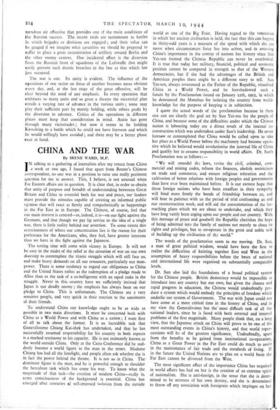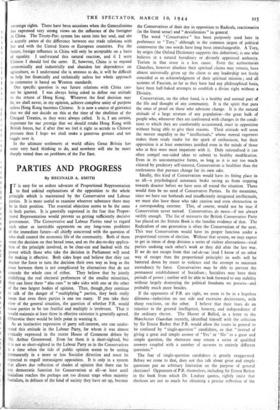CHINA AND THE WAR
By IRENE WARD, M.P.
IN talking to a gathering of journalists after my return from China a week or two ago, I found that apart from Reuter's Chinese correspondent, no one was in a position to raise one really pertinent question for me to answer. This, I believe, is not unusual when Far Eastern affairs are in question. It is clear that, in order to obtain that unity of purpose and breadth of understanding betweeen Great Britain and China so essential both for war and peace, our leaders must provide the stimulus capable of creating an informed public opinion that will react as firmly and sympathetically to happenings in the -Far East as in Europe. The Chinese, of course, feel that our main interest is centred—as, indeed, it is—on our fight against the Germans, and that though we pay lip service to the idea of a single war, there is little reality behind our assertion. To some extent this consciousness of where our concentration lies is the reason for their preference for the Americans, who, they feel, have greater interests than we have in the fight against the Japanese.
The testing time will come with victory in Europe. It will not be easy in the midst of the relief at the cessation of war on our own doorstep to contemplate the titanic struggle which will still face us, and make heavy demands on all our resources, particularly our man- power. There is some tendency to regard our obligations to China and the United States rather as the redemption of a pledge made to Allies than as the task of a co-belligerent with an equal stake in the struggle. Never in this country have we sufficiently insisted that Japan is our deadly enemy ; the emphasis has always been on our pledge to China. This is unfortunate. The Chinese are a very sensitive people, and very quick in their reaction to the sentiments of their friends.
To understand China our knowledge ought to be as wide as possible in two main directions. It must be concerned both with China as a World Power and with China as a nation ; I want first of all to talk about. the former. It is an incredible task that Generalissimo Chiang Kai-shek has undertaken, and that he has successfully assumed responsibility for his country in both aspects is a marked testimony to his capacity. He is not intimately known to the world outside China. Only at the Cairo Conference did he sud- denly become a world figure to the man in the street. Madame Chiang has had all the limelight, and people often ask whether she is in fact the power behind the throne. It is not so in China. The-
dominant figure is the man, and he is powerful enough to shoulder the herculean task which has come his way. To know what the magnitude of that task—the creation of modem China—really is, some consciousness of the background is essential. China has emerged after centuries of self-imposed isolation from the outside
world as one of the Big Four. Having regard to the veneration in which her ancient civilisation is held, the tact that this can happen in thirty-odd years is a measure of the speed with which she can move when circumstances force her into action, and in assessing China's importance in the comity of nations her history since Sun Yat-sen formed the Chinese Republic can never be overlooked. It is true that today her military, financial, political and economic position cannot be compared in strength to that of the Western democracies, but if she had the advantages of the British and American peoples there might be a different story to tell. Sun Yat-sen, always reverenced as the Father of the Republic, visualised China as a World Power, and he foreshadowed such a future by the Proclamation issued on January 12th, 1912, in which he denounced the Manchus for isolating the country from world- knowledge for the purpose of keeping it in subjection.
I quote the actual words of the proclamation because in them one can see clearly the goal set by Sun Yat-sen for the people of China, and because some of the difficulties under which the Chinese nation is labouring today are a direct result of the internal re- construction which was undertaken under Sun's leadership. He never foresaw or contemplated that China would be called upon to take her place as a World Power before the machinery had become opera- tive which he believed would revolutionise the internal life of China and qualify her to assume responsibility in world affairs. Dr. Sun's Proclamation was as follows:—
"We will remodel the laws, revise the cisil, criminal, com- mercial and mining codes, reform the finances, abolish restrictions on trade and commerce, and ensure religious toleration and the cultivation of better relations with foreign peoples and governments than have ever been maintained before. It is our earnest hope that those foreign nations who have been steadfast in their sympathy will bind more firmly the bonds of friendship between us, and will bear in patience with us the period of trial confronting us and our reconstruction work, and will aid the consummation of the far- reaching plans which we are about to undertake, and which they have long vainly been urging upon our people and our country. With this message of peace and goodwill the Republic cherishes the hope of being admitted into the family of nations not merely to share its rights and privileges, but to co-operate in the great and noble task of building up the civilisation of the world."
The words of the proclamation seem to me moving. Dr. Sun, a man of great political wisdom, would have been the first to realise the difficulties of knitting together East and West in the assumption of heavy responsibilities before the bases of national and international life were organised on substantially comparable levels.
Dr. Sun also laid the foundations of a broad political system for the Chinese people. British democracy would be impossible to introduce into any country but our own, but given the chance and rapid progress in education, the Chinese would undoubtedly pro- duce a system which would embody the principles of freedom which underlie our system of Government. The war with Japan could not have come at a more critical time in the history of China, and in my view the Generalissimo has the most difficult task of all the national leaders, since he is faced with both external and internal problems of the first magnitude. Many people think that, on a long view, that the Japanese attack on China will prove to be one of the most outstanding events in China's history, and that world reper- cussions will be of the greatest significance. Undoubtedly, apart from the benefits to be gained from international co-operation, China as a Great Power in the Far East could do much to assist in the maintenance of fair trade and the standards of living. If in the future the United Nations are to plan on a world basis the Far East cannot be divorced from the West.
The most significant effect of the importance China has acquired in world affairs has had on her is the creation of an extreme spirit of nationalism. She is anti-foreign, in the sense that she is deter- mined to be mistress of her own destiny, and she is determined to throw off any association with foreigners which impinges on her sovereign rights. There have been occasions when the Generalissimo has expressed very strong views on the influence of the foreigner in China. The Treaty-Port system has eaten into her soul, and she is acutely aware of the difference between our trade relations with her and with the United States or European countries. For the future, foreign influence in China will only be acceptable on a basis of equality. I understand this natural reaction, and if I were Chinese I should feel the same. If, however, China is to expand economically and industrially and abandon her dependence on agriculture, as I understand she is anxious to do, it will be difficult to help her financially and technically unless her whole approach to commerce is based on Western standards.
One specific question in our future relations with China can- not be ignored. I was always being asked to define our attitude to the return of Hong Kong. Whatever the final decision may be, we shall never, in my opinion, achieve complete unity of purpose unless Hong Kong becomes Chinese. It is now a source of grievance that we did not decide on this at the time of the abolition of the Unequal Treaties, as they were always called. It is, I am certain, important for our prestige that we should retake Hong Kong with British forces, but if after that we feel it right to accede to Chinese pressure then I hope we shall make a generous gesture and not haggle over it.
In the ultimate settlement of world affairs Great Britain has some very hard thinking to do, and nowhere will she be more sharply tested than on problems of the Far East.



























 Previous page
Previous page